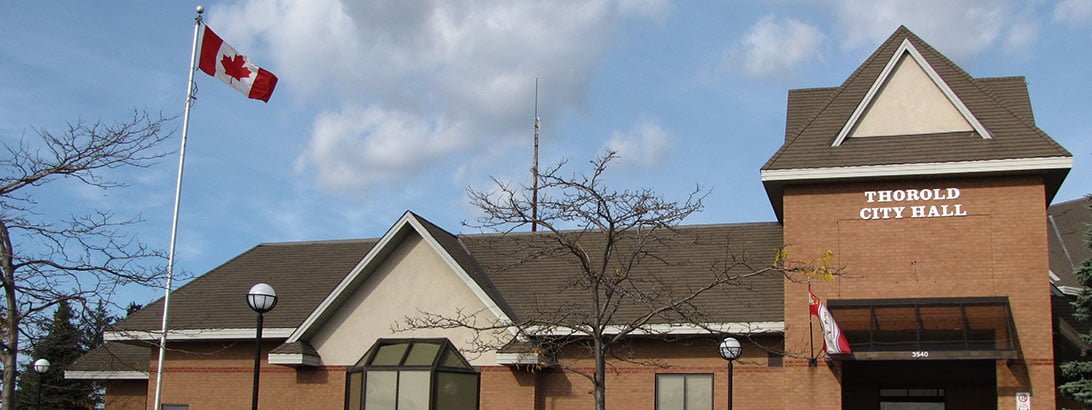Good Evening Mayor Luciani, City Councillors, and members of city staff. My name is Kithio Mwanzia and I am the Director of Policy & Government Relations for the Greater Niagara Chamber of Commerce and I am joined here tonight by Graham Lowe, our Policy Analyst.
The Greater Niagara Chamber of Commerce, is a member driven organization with over 1,500 members representing 45,000 employees. We are the largest business organization in Niagara and the third largest Chamber in Ontario. Within the Chamber, members are able to establish both geographic and sectoral business councils to provide a targeted voice for business – and to facilitate targeted activities to support the connectivity within the network of businesses in our communities. The Thorold Business Council is one of the (8) sector and geographic Business Councils within the Greater Niagara Chamber of Commerce.
Tonight’s presentation has been informed by members of the Thorold business community and the Thorold Business Council, and through consultations with the Niagara Homebuilders’ Association, Niagara Industrial Association and Niagara Construction Association, as a means to bring forward comprehensive, businessfriendly policy solutions.
Tonight, Thorold City Council has the opportunity to make the decision to chart a course that will ensure that the City remains a competitive place to invest and grow a business. The fragile state of Niagara’s economy continues to hamper both economic growth and employment opportunities. Drastic increases in development charges will only act as a further barrier to future economic growth at a time when Niagara needs more economic activity.
As Thorold works to become a prime destination for investment and encourages the growth of a diversified and sustainable economic base, sound public finances make it possible to maintain a competitive tax burden and ensure both the quality and sustainability of public services. With 95% of the businesses in Thorold being Small and Medium Sized Operations, these firms are limited in their ability to absorb large spikes in the cost of doing business.
All businesses are in a competitive global and regional market, and constraints on the ability to develop – byway of development charges – make it more difficult for them to expand their business. Businesses are therefore seeking out jurisdictions where there is sound fiscal planning, as well as smart and business-friendly regulations.
Like many other jurisdictions in Niagara, Thorold is under pressure to manage capital works programs and pay for infrastructure, given the relatively flat Real Assessment Growth over the last four years – versus other high-growth regions like Halton or York. Viewed within this context, the Niagara market is not able to easily absorb pricing increases linked to increased DCs as easily as other markets can. In fact, this point was noted in the City of Thorold Development Charge Background study, where the report indicated that high development charges represent a barrier to increased economic activity and sustained industrial, commercial and residential growth.
While we understand the need for municipalities to fund capital infrastructure and the amenities to support long-term community growth, a balance is required in today’s economic conditions to ensure that increasing cost recovery rates don’t hinder future overall economic growth.
Additionally, we would like to recognize the changes that have been made in recognition of the business community’s input, including:
- Excluding portions of Port Robinson from this Development Charge By-Law and deferring them to a future Development Charge By-Law.
- Including the phasing-in of development charge rates for commercial developments.
However, there are still significant concerns with the proposal before you tonight and the adverse impact it will have on Thorold’s ability to foster business growth. Therefore we are recommending the following this evening:
- Eliminate industrial development charge rates given the abundance of existing, serviced industrial sites – looking at comparable jurisdictions both inside and outside of Niagara, they have eliminated their development charges in this category. As manufacturers seek to grow, they will be looking for jurisdictions that allow them to compete in a hypercompetitive market place. Moving forward with the industrial development charges as proposed will negatively impact Thorold’s ability to attract investment.
- Phase-in residential development charges over the 5-year period of the By-Law – Immediately increasing development charges on residential developments will significantly impact the cost of homes and drastically impact Thorold’s overall new home absorption rate and ultimately its new home start rate.
To conclude, we are fully aware of the difficulty of funding longterm capital programs during difficult economic times. And the recommendations we have brought forward this evening are aimed at establishing competitive fiscal tools and matching strategies that will increase real assessment growth and facilitate business growth.
Thorold has to grow its way out of its fiscal challenges, through sound fiscal planning. We look forward to continuing to work with you to overcome these challenges.
Thank you again for providing the Chamber with the opportunity to speak this evening and I look forward to your questions.



